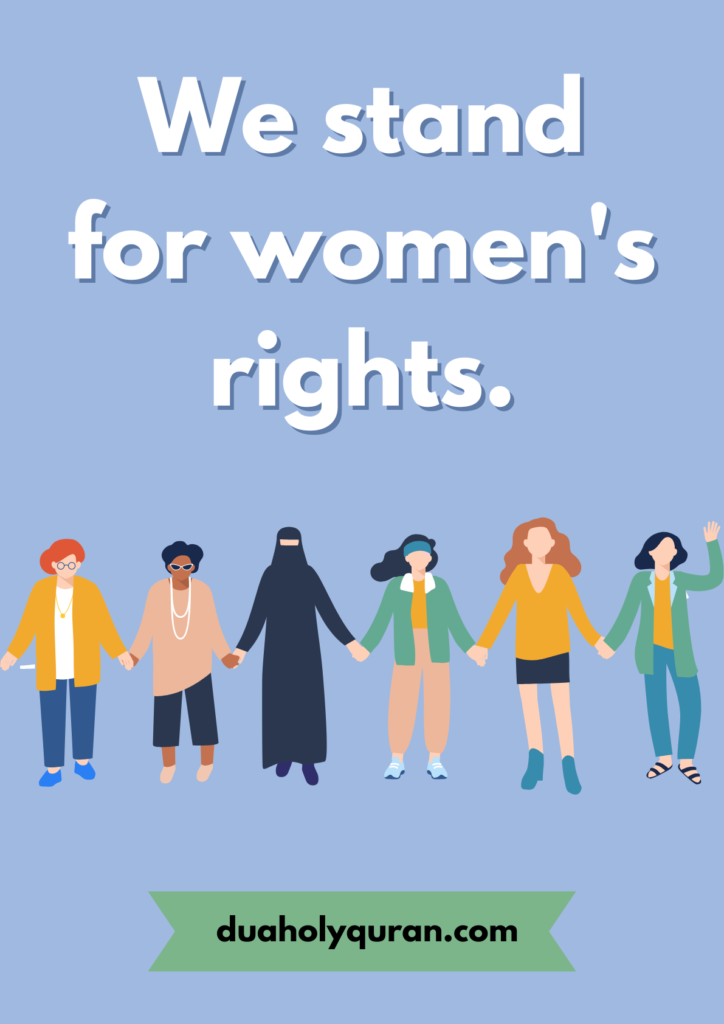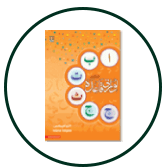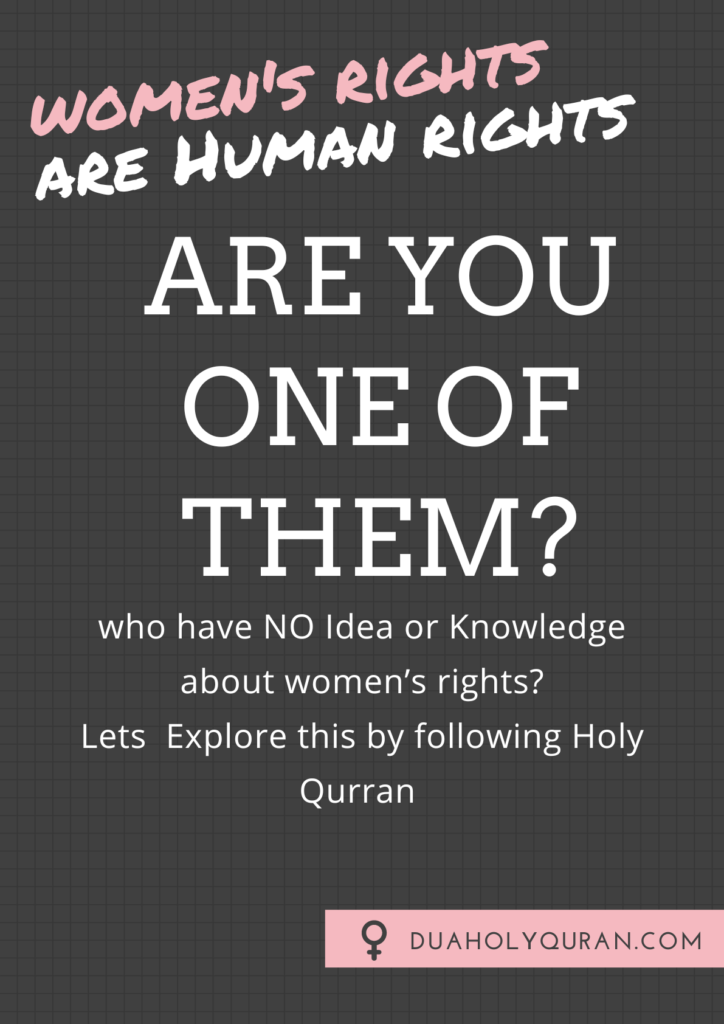Understanding Women’s Rights in Islam is an Important Step Towards Empowering Women
A delicate relationship exists between Islam and gender norms and the rights of women, just as it does with every other religion. Interpretations have altered over the course of several centuries, which has resulted in a vast diversity of cultural practices and legal systems in societies where Muslims make up the majority. In addition to answering regularly asked problems, the objective of this website is to study the underlying notions of women’s rights in Islam, as well as to counter current errors.
Women’s rights in Islamic teachings are brought to light by The Foundation.
It is the Quran, the holy book of Islam, as well as the Hadith, which are the sayings and deeds of the Prophet Muhammad (peace be upon him) that serve as the basis for women’s rights in Islam. Islamic teachings lay a great focus on the values of equality and justice, which extend to the dynamics of gender relations. In the Quran, it is claimed that “And their Lord has accepted of them, and answered them: ‘Never will I suffer to be lost the work of any of you, be he male or female: You are members, one of another…'” This declaration is an emphatic affirmation of the equality of men and women before God.
It is mentioned in the Quran 3:195. This verse highlights the spiritual equality that exists between men and women in the faith of Islam.
Additionally, the Prophet Muhammad (peace be upon him) underlined the significance of respecting and appreciating women. He famously stated, “The best among you are those who are best to their wives.” This Hadith highlights the necessity of treating women with kindness and compassion, refuting stereotypes that characterize Islam as oppressive to women.
Legal Rights and Protections for Women in Islam
Islamic jurisprudence, or Shariah law, gives unique rights and protections for women within many sectors of life, including marriage, divorce, inheritance, and education. Contrary to misconceptions, Islam offers women the opportunity to consent to marriage, inherit property, pursue education, and engage in business.
Marriage in Islam is a business transaction between consenting persons, and women have the power to stipulate stipulations in the marriage contract, such as financial considerations and the right to divorce (khula). Moreover, Islam rejects forced marriages and emphasizes the requirement of mutual respect and consent between spouses.
In regards of divorce, Islam gives women with the right to request dissolution of the marriage if it becomes untenable. The Quran recommends a waiting period (iddah) post divorce to determine that the woman is not pregnant and to encourage emotional healing.
Regarding inheritance, Islamic law specifies that women are allowed to receive a share of the deceased’s wealth, normally half of what male heirs obtain. While this disparity may look unequal, it’s crucial to understand that Islamic inheritance regulations examine various elements, including the financial duty of male relatives to provide for their families.
Furthermore, Islam encourages both men and women to gain knowledge and seek education. The Prophet Muhammad (peace be upon him) highlighted the significance of attaining knowledge, adding, “Seeking knowledge is obligatory for every Muslim.” Historically, Muslim women have made great contributions to research, science, and writing, dispelling stereotypes about women’s place in Muslim societies.

Challenging Misconceptions: Addressing Common Myths
Despite the ideas of equality and justice within Islam, misconceptions and biases exist concerning women’s rights in Muslim-majority communities. One popular fallacy is that Islam oppresses women by demanding their seclusion or restricting their freedom. While particular cultures may follow purdah (seclusion), it’s not a universal Islamic necessity. Islam supports modesty and decency for both men and women, creating relationships based on respect and dignity.
Another myth is that Islam condones violence against women. In truth, Islam unequivocally condemns all sorts of violence and abuse. The Quran reads, “O you who have believed, it is not authorized for you to inherit women by duress. And do not generate issues for them in order to take [back] part of what you given them unless they commit a gross sin. And live with them in friendship…” (Quran 4:19). This text highlights the imperative of treating women with respect and condemns coercion or mistreatment.
Furthermore, misconceptions surrounding Islamic dress restrictions, such as the hijab, abound. The hijab is a statement of humility and dignity, not dictatorship. Many Muslim women decide to wear the hijab as a statement of their faith and identity, reclaiming control over their bodies and rejecting societal norms.
FAQs: Clarifying Common Questions
1. Does Islam accept domestic violence?
No, Islam clearly condemns violence against women. The Quran and Hadith promote love, respect, and compassion in all relationships, including marriage.*
2. Are women authorized to work in Islam?
Yes, Islam encourages both men and women to engage in productive work and contribute to society. However, Islamic principles support the wellbeing of the family, and women are not required to work if their financial necessities are covered by their male relatives.
3. Is polygamy allowed in Islam?
While Islam supports polygamy under particular instances, it is not an obligation, and it is subject to harsh criteria, including fair treatment of all spouses and the ability to support financially and emotionally for numerous wives.*
4. Are women required to wear the hijab?
The hijab is a symbol of modesty and dignity in Islam, but its observance varies among individuals and cultures. While some Muslim women choose to wear the hijab as an expression of faith, others may not, and there is diversity in interpretation regarding its obligation.
5. Do Muslim women have the right to divorce?
Yes, Muslim women have the right to seek divorce (khula) under Islamic law if the marriage becomes untenable. However, the process and requirements for divorce may vary depending on cultural and legal contexts within different Muslim-majority societies.
6. Are women allowed to lead prayers in Islam?
While women are not traditionally appointed as imams (prayer leaders) in mixed-gender congregational prayers in many Muslim communities, they can lead prayers in all-female gatherings. There is ongoing debate and varying interpretations among scholars regarding women’s roles in leading mixed-gender congregational prayers.
7. Are women’s testimonies considered equal to men’s in Islamic law?
Islamic jurisprudence acknowledges that there are situations where the testimony of women may differ from that of men due to their experiences and perspectives. However, this does not imply inequality; rather, Islamic law considers the context and circumstances of each case when evaluating testimonies.
Conclusion: Empowering Women within Islamic Principles
In conclusion, women’s rights in Islam are fundamentally founded on ideas of equality, fairness, and compassion. Islam promotes the spiritual equality of men and women, granting women legal rights and protections in all spheres of life. While stereotypes and biases exist, it’s vital to acknowledge the multiplicity of interpretations within Islam and the agency of Muslim women in shaping their lives and communities. By studying and practicing the ideals of women’s rights in Islam, we may strive for a more inclusive and equitable society for all.







